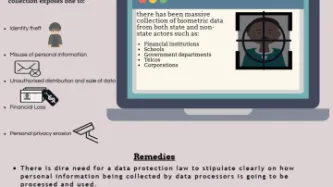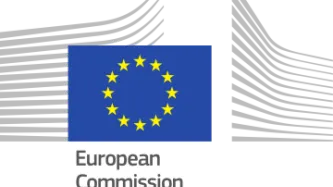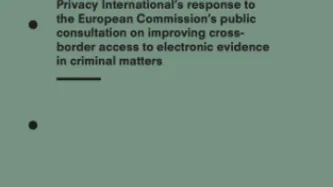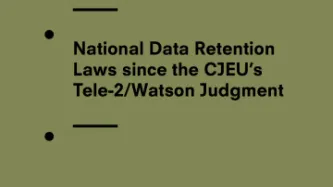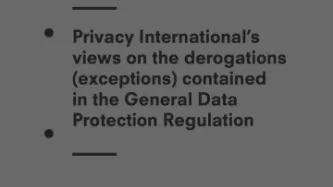Search
Content type: News & Analysis
This post was written by PI Policy Officer Lucy Purdon.
In 1956, US Presidential hopeful Adlai Stevenson remarked that the hardest part of any political campaign is how to win without proving you are unworthy of winning. Political campaigning has always been a messy affair and now the online space is where elections are truly won and lost. Highly targeted campaign messages and adverts flood online searches and social media feeds. Click, share, repeat; this is what political engagement looks…
Content type: Advocacy
Privacy International's comments to the Article 29 Working Party Guidelines on automated individual decision-making and profiling are here.
Content type: News & Analysis
Overview
CIPIT is currently investigating how the privacy of Kenyan citizens was affected by the use of biometric data during the just concluded 2017 general and repeat elections. The IEBC is mandated by law to register voters, verify their registration details and conduct elections. Accordingly, the IEBC is the custodian of the public voter register. There have been reports that individuals received SMS texts from candidates vying for various political seats during the campaign period of the…
Content type: Long Read
The battle for Kenyan voters’ allegiance in the 2017 Presidential election was fought on social media and the blogosphere. Paid advertisements for two mysterious, anonymous sites in particular started to dominate Google searches for dozens of election-related terms in the months leading up to the vote. All linked back to either “The Real Raila”, a virulent attack campaign against presidential hopeful Raila Odinga, or Uhuru for Us, a site showcasing President Uhuru Kenyatta’s accomplishments. As…
Content type: Press release
A new investigation published today by Privacy International reveals the role of an American data-based digital advertising company in the highly divisive online re-election campaign of Kenyan president Uhuru Kenyatta.
In the run-up to Kenya's presidential election in August 2017, paid advertisements for two mysterious sites dominated Google searches for election-related terms and flooded Kenyans' social media feeds. All linked back to either 'The Real Raila', a virulent attack campaign…
Content type: News & Analysis
Recently, a text from a local telecommunications company inquired whether its subscribers knew that they could now enroll their voice so they could access various services securely and conveniently. This added a further dynamic to the on-going debate in several quarters on the accelerated adoption of biometrics in Kenya. Does Kenya have the necessary framework in place to safeguard the privacy and security of its citizens? The reality is, innovators will not wait for an optimal…
Content type: News & Analysis
Following the alarming evidence that EU-made electronic surveillance equipment is still being exported to authoritarian countries around the world, we strongly urge all EU member states and institutions to respect their human rights obligations and call on them to prioritise long overdue EU reforms.
We are extremely concerned that little has changed since civil society first recognised the need to modernise current EU rules governing the export of surveillance equipment as far back…
Content type: News & Analysis
7 July 2016
It has been said is that we pay for free services with our personal data. Now, the Privacy Shield exponentially expands this truth and we are paying for the cost of U.S. political dysfunction combined with EU complacency with our privacy. More than four months after the first EU-US Privacy Shield was published on 29 February 2016, a new version has been leaked. Remarkably, it is expected to be adopted.
Four months, two opinions by group of EU data protection…
Content type: News & Analysis
This piece originally appeared in Open Democracy here.
As the UK Parliament returns from its summer break, everyone’s back to talking about Brexit. But there’s another policy of existential significance to our democracy that we really need to be talking about. I refer here to the innocuously named ‘Investigatory Powers Bill’. The House of Lords have been debating the ‘bulk powers’ — what we would call the mass surveillance measures — of the Bill over the recent days. We are literally…
Content type: Report
Financial services are changing, with technology being a key driver. It is affecting the nature of financial services, from credit and lending through to insurance, and even the future of money itself.
The field of fintech is where the attention and investment is flowing. Within it, new sources of data are being used by existing institutions and new entrants. They are using new forms of data analysis.
These changes are significant to this sector and the lives of people it serves. This…
Content type: Advocacy
Privacy International has responded to the European Commission’s consultation on the interoperability of EU information systems for borders and security.
The Commission is currently looking at ways in which various border control and policing EU databases and IT systems can be connected to share and exchange more data.
The plans raise a number of concerns as highlighted by Privacy International in our response. These relate to significant potential harms associated with…
Content type: Advocacy
On 23 October 2017, Privacy International contributed to the public consultation of the European Commission on improving cross border access to electronic evidence for criminal investigation. The consultation raises important questions, particularly in relation to preserving human rights protection and safeguards as national police forces seek digital evidence in other jurisdictions.
The EU is not the only inter-governmental organisation seeking to address the complex jurisdictional…
Content type: News & Analysis
We found this image here.
On 11 October, the LIBE Committee of the European Parliament votes on the draft e-privacy regulation. As the landscape of generation, collection, and other processing of data in the digital sphere evolves, the proposal seeks to update the rules on confidentiality and security of electronic communications and online activities.
Unsurprisingly, companies whose business models rely on tracking individuals online have been busy lobbying against the new regulation. The…
Content type: Press release
Key points
Privacy International surveyed 21 EU member states' legislation on data retention and examined their compliance with fundamental human rights standards
0 out of the 21 States examined by PI are currently in compliance with these standards (as interpreted in two landmark judgements by the Court of Justice of the European Union: Tele-2/Watson and Digital Rights Ireland)
Privacy International is calling for:
EU member states to review their legislation on data retention…
Content type: Advocacy
This report sheds light on the current state of affairs in data retention regulation across the EU post the Tele-2/Watson judgment. Privacy International has consulted with digital rights NGOs and industry from across the European Union to survey 21 national jurisdictions (Austria, Belgium, Bulgaria, Croatia, Cyprus, Czech Republic, France, Germany, Hungary, Ireland, Italy, Luxembourg, the Netherlands, Poland, Portugal, Romania, Slovakia, Slovenia, Spain, Sweden, and the United…
Content type: News & Analysis
Photo Credit: MoD UK
‘Security’ in the policy world has practically no currency without a specific prefix. For example, we could discuss 'national' security as distinct from 'consumer' security or 'energy' security. ‘Cyber’ security is the new prefix on the policy block, and it is gradually forcing a rethink on what it means to be secure in a modern society. In the course of Privacy International’s work globally, we have observed that many governments frame cyber security as national security…
Content type: Long Read
In January 2017, Kenya’s information and communication technology regulator, the Communications Authority of Kenya, announced that it was spending over 2 billion shillings (around 14 million USD) on new initiatives to monitor Kenyans’ communications and regulate their communications devices. The press lit up with claims of spying, and members of Kenya’s ICT community vowed to reject the initiatives as violating Kenyans’ constitutional rights, including the right to privacy (Article 31…
Content type: Press release
Please find attached a copy of the briefing along with promotional photographs with the briefing.
Privacy International has today sent top EU and UK Brexit negotiators* a briefing on their vulnerability to potential surveillance by each other, and others. Brexit negotiations are to begin today.
The global privacy rights NGO has highlighted to the negotiators the risk of sophisticated surveillance capabilities being deployed against each other and by others, and provided…
Content type: News & Analysis
Image source: AFP
Earlier this month, the Kenyan daily The Star reported that UK-based data analytics firm Cambridge Analytica had been quietly contracted by President Uhuru Kenyatta’s party in a bid to win himself a second term in office. State House officials were quick to deny the claims, while the company itself issued no comment.
Cambridge Analytica has exploded onto the scene following revelations that its psychometric profiling techniques were used and reportedly played a role in…
Content type: Advocacy
Earlier this month, it was reported that UK-based data analytics firm Cambridge Analytica had been quietly contracted by President Uhuru Kenyatta’s party in a bid to win a second term in office. Privacy International has written to Cambridge Analytica to learn more about how the company assessed the risk of its work in Kenya and how it will ensure that Kenyans’ personal data will be protected.
Content type: Advocacy
Privacy International welcomes the willingness of the UK government to implement the EU General Data Protection Regulation (GDPR), which provides stronger standards of protection of personal data to those contained in the EU Directive 1995, whose provisions were implemented in the Data Protection Act 1998. Improved rights and enforcement measures will generate greater trust and therefore greater engagement in the digital environment, which will in turn benefit the economy. …
Content type: News & Analysis
On a hot day in Nairobi, our researcher is speaking to an officer of Kenya’s National Intelligence Service (NIS). The afternoon is wearing on and the conversation has turned to the presidential elections, taking place in August this year. He has just finished describing the NIS’ highly secret surveillance powers and the disturbing ways in which these powers are deployed.
“It is what you might call ‘acceptable deaths,’” he states about the misuse of communications surveillance powers. “People…
Content type: Report
This investigation focuses on the techniques, tools and culture of Kenyan police and intelligence agencies’ communications surveillance practices. It focuses primarily on the use of surveillance for counterterrorism operations. It contrasts the fiction and reality of how communications content and data is intercepted and how communications data is fed into the cycle of arrests, torture and disappearances.
Communications surveillance is being carried out by Kenyan state actors, essentially…




